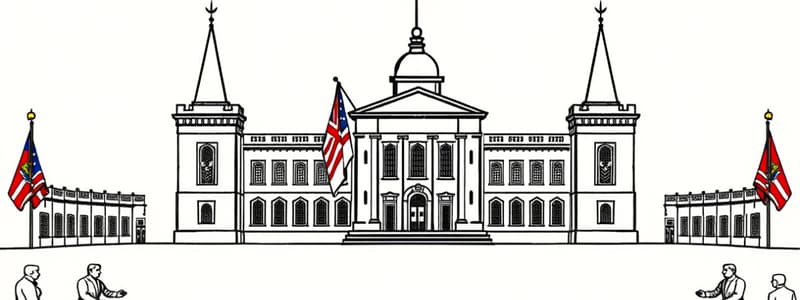Podcast
Questions and Answers
What is a pro of monarchy?
What is a pro of monarchy?
- Clear line of succession (correct)
- Equality of leadership
- Efficient way of carrying out decisions (correct)
- Job of running a nation is easy
What is a con of monarchy?
What is a con of monarchy?
- Centralized power
- Strong leadership
- Efficient governance
- Equality of leadership can vary dramatically (correct)
Which is a pro of dictatorship?
Which is a pro of dictatorship?
- Can maintain peace and order (correct)
- Multiple leaders
- Decentralized power
- Frequent elections
What is a con of dictatorship?
What is a con of dictatorship?
What is a pro of theocracy?
What is a pro of theocracy?
What is a con of theocracy?
What is a con of theocracy?
What is a pro of a single-party state?
What is a pro of a single-party state?
What is a con of a single-party state?
What is a con of a single-party state?
What is a pro of direct democracy?
What is a pro of direct democracy?
What is a con of direct democracy?
What is a con of direct democracy?
What is a pro of parliamentary democracy?
What is a pro of parliamentary democracy?
What is a con of parliamentary democracy?
What is a con of parliamentary democracy?
What is a pro of presidential democracy?
What is a pro of presidential democracy?
What is a con of presidential democracy?
What is a con of presidential democracy?
Flashcards are hidden until you start studying
Study Notes
Monarchy
-
Efficient decision-making process due to centralized power.
-
Clear succession line enhances stability and continuity.
-
Loyalty to the monarch fosters national unity.
-
Leadership equality can fluctuate significantly, causing disparities.
-
Modern governance complexities may exceed the abilities of most monarchs.
Dictatorship
-
Centralization of power in one leader allows for quick and effective government actions.
-
Control over military and police contributes to maintaining order and peace.
-
Potential for human rights abuses against dissenters is high.
-
Dictators often contend with questions regarding their legitimacy.
Theocracy
-
A state-supported religion can strengthen political and social cohesion.
-
Ensures that political actions align with the moral values and beliefs of the populace.
-
Religious minorities may face discrimination and oppression.
-
Larger states struggle to maintain religious homogeneity, complicating governance.
Single Party State
-
Absence of competing political parties can reduce power struggles.
-
Legislative processes may be streamlined, allowing for expedient lawmaking.
-
The elite's views may not represent the general population, causing societal unrest.
-
Political dissenters often find themselves excluded from decision-making.
Direct Democracy
-
Empowers every citizen to participate in decision-making.
-
Policy decisions tend to carry broad public support.
-
The process can be labor-intensive and time-consuming for participants.
Parliamentary Democracy
-
Majority party alignment with the prime minister eases legislative passage.
-
Lack of separation between executive and legislative branches can diminish checks on power.
-
Instability can arise from the possibility of the prime minister being forced to resign.
Presidential Democracy
-
Direct election of presidents enhances accountability and responsiveness to public needs.
-
Presidents typically have stronger public support than prime ministers from parliament.
-
Separation of powers allows for mutual oversight between branches of government.
-
Stability may be greater than in systems where prime ministers can be easily dismissed.
-
Difficulty in impeaching presidents before their term ends can lead to prolonged term limits.
-
Legislative gridlock can occur if the president and legislature are from different parties.
-
Potential exists for presidents to exploit their power to create authoritarian governance.
Studying That Suits You
Use AI to generate personalized quizzes and flashcards to suit your learning preferences.




